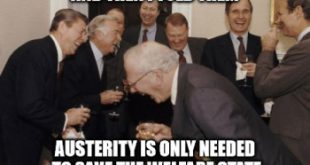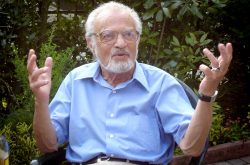Richard Feynman om mathematics In a comment on one of yours truly’s posts last week, Jorge Buzaglo wrote this truly interesting comment: Nobel prize winner Richard Feynman on the use of mathematics: “Mathematicians, or people who have very mathematical minds, are often led astray when “studying” economics because they lose sight of the economics. They say: ‘Look, these equations … are all there is to economics; it is admitted by the economists that there is...
Read More »Calibration — an economics fraud kit
Calibration — an economics fraud kit In his well-written and interesting article The Trouble with Macroeconomics, Paul Romer goes to a frontal attack on the theories that have put macroeconomics on a path of ‘intellectual regress’ for three decades now: Macroeconomists got comfortable with the idea that fluctuations in macroeconomic aggregates are caused by imaginary shocks, instead of actions that people take, after Kydland and Prescott (1982) launched...
Read More »Solow on the non-existence of a ‘natural rate of unemployment’
The second, and even more striking, contribution of the 1968 presidential address was Friedman’s introduction of the ‘natural rate of unemployment’ along with the long-run vertical Phillips curve and its accelerationist implications. The natural rate was, famously, what would be ‘ground out’ by Walrasian general equilibrium, provided it incorporated ‘the actual structural characteristics of the labor and commodity markets, including market imperfections, stochastic...
Read More »Debunking mathematical economics
The belief in the power and necessity of formalizing economic theory mathematically has thus obliterated the distinction between cognitively perceiving and understanding concepts from different domains and mapping them into each other. Whether the age-old problem of the equality between supply and demand should be mathematically formalized as a system of inequalities or equalities is not something that should be decided by mathematical knowledge or convenience. Surely it would...
Read More »Austerity delusions
To many conservative and neoliberal politicians and economists, there seems to be a spectre haunting the United States and Europe today — Keynesian ideas on governments pursuing policies raising effective demand and supporting employment. And some of the favourite arguments used among these Keynesophobics to fight it are the ‘confidence argument’ and the ‘doctrine of sound finance.’ Is this witless crusade against economic reason new? Not at all. If mainstream economists had...
Read More »Modern economics is sick
Modern economics is sick Modern economics is sick. Economics has increasingly become an intellectual game played for its own sake and not for its practical consequences for understanding the economic world. Economists have converted the subject into a sort of social mathematics in which analytical rigour is everything and practical relevance is nothing … If there is such a thing as “original sin” in economic methodology, it is the worship of the idol of the...
Read More »Debunking mainstream economics
[embedded content] Advertisements
Read More »Heterodoxy and pluralism in economics
Heterodoxy and pluralism in economics A sense of failure is, for all intents and purposes, being translated into a context of relative success requiring more limited changes – though these are still being seen as significant. Part of the reason that they are seen as significant is that changes from within mainstream economics do not have to be major in order to appear radical. It is our contention that heterodox economics is being marginalised in this...
Read More »Recovering Keynesian Phillips curve theory: hysteresis of ideas and the natural rate of unemployment
Economic theory is prone to hysteresis. Once an idea is adopted it is difficult to change. In the 1970s, the economics profession abandoned the Keynesian Phillips curve and adopted Milton Friedman’s natural rate of unemployment (NRU) hypothesis. The shift was facilitated by a series of lucky breaks. Despite much evidence against the NRU, and much [...]
Read More »Carpe diem (personal)
Early morning walk with Hedda on our island today. Advertisements
Read More » Heterodox
Heterodox








